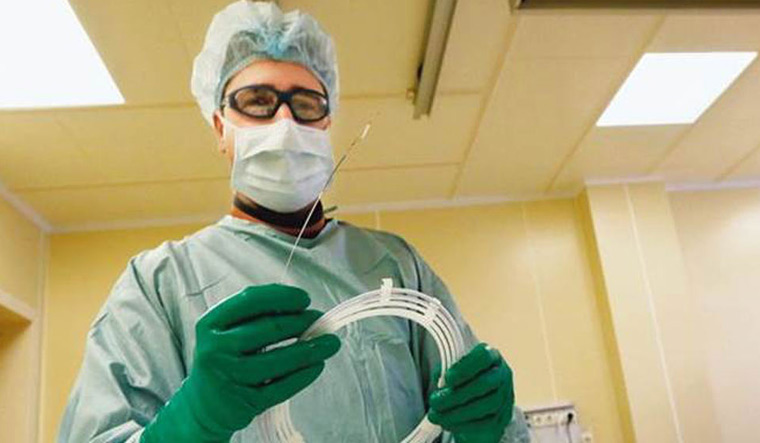The case of a new, made-in-India, “innovative”, coronary stent might just prove to be a test case for pricing and regulation of medical devices in the country. MeRes100, the bioresorable vascular scaffold stent, manufactured by Vapi-based medical technology company Meril Life Sciences, is currently awaiting its launch for Indian patients. The “novel” stent that had been approved by the Central Drugs Standard Control Organisation, India's top drug regulator, in 2017, is awaiting government approval for a price cap exemption.
Since 2017, coronary stents in the country fall within the ambit of price capping— bare metal stents are priced at Rs 8,261, and the price of a drug-eluting stents [DES] is capped at Rs 30,080.
In the case of MeRes100, however, Meril Life Sciences, a global medical technology company, has asked to be exempt from price capping. “We have requested [the government] for a price exemption for MeRes100 under Drug Price Control Order, 2013,” a company spokesperson said. This exemption is offered to companies adhering to certain key criteria: new and innovative drug development, indigenously researched and manufactured, as well as patented under the Indian Patent Act, 1970, the spokesperson told THE WEEK, adding that MeRes100 has fulfilled all the “necessary” criterion.
Bioresorbable scaffolds (BRS) were designed to overcome the limitations of metallic stents. However, globally, there are concerns about their long-term safety.
According to the Meril spokesperson, MeRes100 BRS (BioResorbable vascular scaffold) is an “extensively researched innovation backed by a three-year clinical and two-year high-resolution OCT (Optical coherence tomography) imaging follow-up in patients, in and outside India”. “This data is encouraging with very low rate of major adverse events and a zero per cent stent thrombosis or clotting in patients upto three years of follow-up,” the official said.
However, a section of drug activists have raised concerns over the safety of the device, citing “limited clinical data” presented by the company. “There is limited clinical data for MeRes100 through the MeRes-1 and MeRes-1 Extend [unpublished] studies. But MeRes-1 was a single-arm, observational registry without any active comparator. The sample size of 108 stable patients is too small, and there's no justification for it,” members of the All India Drug Action Network stated in a submission to an expert committee set up under the Standing National Committee on Medicines that is reviewing the issue.
Though the study reported favourable results, in their submission, AIDAN has pointed to the limitations acknowledged in the published study itself which state: “The results of our study are based on the first-inhuman study in a relatively small number of stable patients with non-complex coronary lesions. Also, the results cannot be generalised to more complex lesions or higher-risk patients. The low MACE (major adverse cardiac event) rate needs a cautious interpretation given the single-arm trial design without any active comparator. Any inference of non-inferior or superior safety against current-generation drug-eluting stents or scaffolds is not possible.”
Members of AIDAN also said that the drug regulator's non-insistence upon a comparative trial against the standard current therapy is “questionable and problematic”.
In a statement to THE WEEK, the company spokesperson highlighted that MeRes100 BRS had received the “CE mark [European] approval along with eight patents (across various countries including China, USA, Japan etc.)”. “We also have a 122E approval granted after evaluation by CDSCO [drug regulator]. Furthermore, we are committed to effective access of BRS therapy to patients and will continue to invest in large scale randomized studies and registries for long term follow-up. We are confident that our innovation will benefit patients in need of this revolutionary therapy across the globe including India, and we are hopeful of an encouraging decision from the authorities concerned."
However, AIDAN has contended that the CE approval for medical devices, particularly high-risk devices and implants, is a “deeply flawed system and must not be used as the basis for allowing an inadequately tested device on the Indian market”.
“We recommend that CDSCO re-examine the licence for MeRes100 in the interest of patient safety. Further studies of the device—a larger, sufficiently powered, randomized trial against current generation DES—should be a requirement for proving safety of the technology relative to DES and a prior condition for launching of the product in the Indian market. We recommend that Meril’s [exemption] application be put on hold as safety for its device is yet to be proven."



